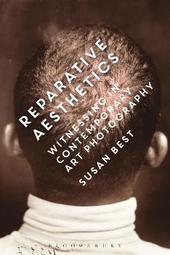
|
Reparative Aesthetics: Witnessing in Contemporary Art Photography
Hardback
Main Details
| Title |
Reparative Aesthetics: Witnessing in Contemporary Art Photography
|
| Authors and Contributors |
By (author) Susan Best
|
| Physical Properties |
| Format:Hardback | | Pages:232 | | Dimensions(mm): Height 234,Width 156 |
|
| Category/Genre | Photography and photographs
Philosophy - aesthetics |
|---|
| ISBN/Barcode |
9781472529787
|
| Classifications | Dewey:111.85 |
|---|
| Audience | | Professional & Vocational | | Tertiary Education (US: College) | |
|---|
| Illustrations |
52 bw illus
|
|
Publishing Details |
| Publisher |
Bloomsbury Publishing PLC
|
| Imprint |
Bloomsbury Academic
|
| Publication Date |
20 October 2016 |
| Publication Country |
United Kingdom
|
Description
By offering a new way of thinking about the role of politically engaged art, Susan Best opens up a new aesthetic field: reparative aesthetics. The book identifies an innovative aesthetic on the part of women photographers from the southern hemisphere, who against the dominant modes of criticality in political art, look at how cultural production can be reparative. The winner of the Art Association of Australia and New Zealand best book award in 2017, Reparative Aesthetics contributes an entirely new theory to the interdisciplinary fields of aesthetics, affect studies, feminist theory, politics and photography. Conceptually innovative and fiercely original this book will move us beyond old political and cultural stalemates and into new terrain for analysis and reflection.
Author Biography
Susan Best is Professor of Fine Art and Art Theory at Queensland College of Art, Griffith University, Australia. Recent publications include Visualizing Feeling: Affect and the Feminine Avant-garde (2011) which won the Art Association of Australia and New Zealand best book award in 2012.
ReviewsThis book begins with an extraordinary hypothesis: that art can function to mark, to remember and to heal social personal and collective shame. Rather than personal or historical expression, art can act as a form of reparative memory of what cannot be otherwise adequately represented. Reparative Aesthetics develops a new account of what photographic art by women artists from the global south is able to accomplish through the acknowledgement and exposure of shame. Beautifully and hauntingly written, this book reminds us that art expresses what cannot be said. -- Elizabeth Grosz, Professor of Women's Studies and Literature, Duke University, USA Susan Best's work trail blazes a compelling narrative through art and psychoanalysis, revealing how the work of four women artists who 'look closely at our dark side' inform contemporary debates on the politics of trauma and repair. -- Ann Stephen, Senior Curator, University Art Gallery and Art Collection, Department of Art History, University of Sydney, Australia Susan Best's book is in itself reparative. Rather than following the standard position and staking a claim for one form of interpretation, she elegantly draws together lines of thought, debate and art practice. Focusing on women artists from the southern hemisphere who use photography to manifest the complexities of history, Best, with great subtly and erudition, builds on their practice rather than using it as illustration. This book has important application to cultural production from all parts of the world and releases viewer, thinker and artist from much of the endism which has consumed art theory over past decades. -- Judy Annear, senior curator, photographs, Art Galley of NSW, Sydney, Australia Effecting her own reparation between affect theories and psychoanalysis, Susan Best gives us an impressive account of shame, guilt and witnessing in the work of four women photographers. Reparative Aesthetics is eloquent and persuasive, meticulous and critically astute; moving its reader beyond the impasses of identity politics, it enables us to look anew at how difficult and distressing national histories are being transformed. A deeply engaging book that confirms Susan Best's credentials as a discerning and skilled analyst of affect, art and politics. -- Elizabeth A. Wilson, Professor and Department Chair of Women's, Gender, and Sexuality Studies, Emory University, USA
|